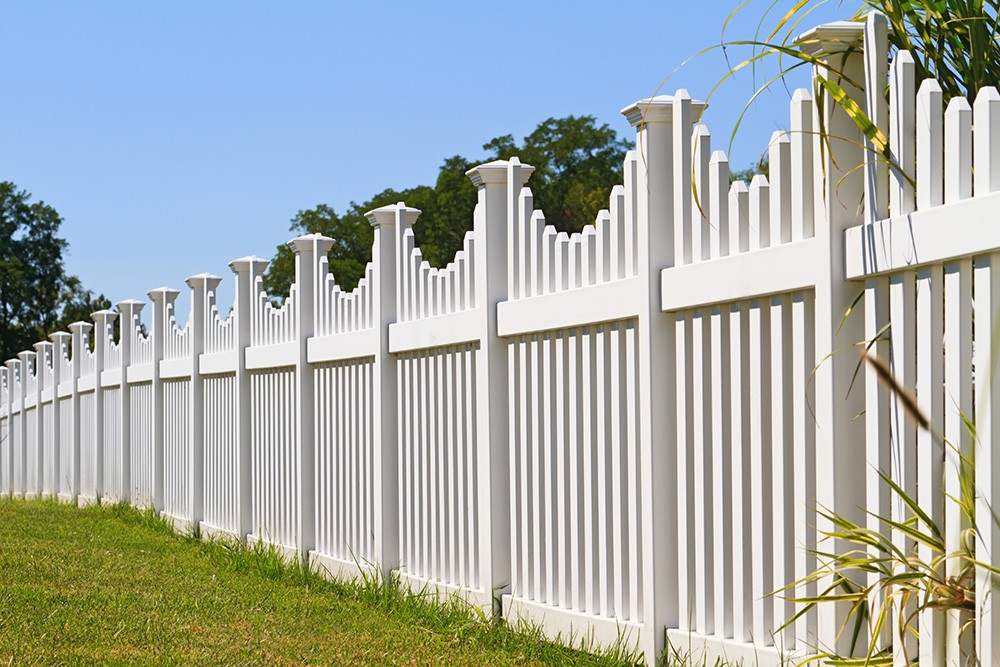
There are half-dozen fence materials that you can choose from to highlight the privacy and security of your property. You can juggle your choice considering factors that are most important to you like longevity, color, style, cost, or durability.
As you shop around for the best fence material, you may want to prioritize your needs and wants and review the pros and cons of each material to help you make an informed decision.
Learn more about these exciting options for your fence then decide whether you will install it yourself or hire an expert fencing contractor.
Vinyl Fencing
Vinyl is one that is out of the traditional list of fence materials but carries many advantages. They are made using synthetic (PVC, polypropylene, nylon, polyethylene) or various recycled plastics.
Pros
- Easily cleaned by hosing down
- Weather-resistant
- Insect-proof
- High-quality vinyl is extremely durable and can withstand winds, rain, and sun
- Available in a wide range of styles
- Lightweight and effortless to work with
- Can be installed DIY by clicking vinyl rails into the posts
Cons
- Not natural-looking
- More expensive than other fence materials
- Color selection is limited
- Not eco-friendly because it is difficult to recycle
- Poor quality vinyl can be damaged by UV rays and excessive heat or cold
Pressure-treated Wood
In whatever way that wood is used in construction, it gives a natural and warm feeling. However, it needs to be treated with fungicide and chemicals to protect it from the weather and destructive insects. Hence the pressure treatment.
The popular types of wood for fencing are cedar, teak, and redwood because of their durable and long-lasting properties.
Pros
- Resistant to moisture, rot, and termites
- Natural aesthetic appeal
- Affordable
- Sturdy
- Readily available when locally grown
- Truly eco-friendly
Cons
- High maintenance (needs regular painting or varnishing to maintain the durability and aesthetics of the fence)
- Vulnerable to warping, rot, fire, and insect infestation
Aluminum
Aluminum is one of the most popular choices of homeowners for a fence material because of its many advantages. It is constructed primarily out of the element aluminum and is used for both commercial and residential use.
Pros
- Very versatile (malleable, easily molded, and capable of being welded)
- Minimal maintenance
- Rust-resistant
- Lightweight
- Available in 4 strength grades
- Resists fading
- Will not crack
- Long-lasting aluminum is 100% recyclable
Cons
- High-quality aluminum is expensive
- Lower-grade aluminum is not very strong
- Has low-impact resistance (susceptible to bending or denting)
Wrought Iron
If security is your key factor, fencing your property with a wrought iron fence is the ideal option. It is definitely a viable option over other fence materials because you can make a unique statement with a wrought fence.
Pros
- Excellent durability especially when coated with a layer of zinc and galvanized
- Hard and strong material that will stand the test of time
- Can guarantee high security
- Impact-resistant
- Low maintenance because they are not easily damaged
- Can be custom-designed
- Provides a classic yet contemporary look
- Can be reused and recycled
Cons
- Installation is more complex than aluminum because of its rugged nature
- More expensive than other fence materials
- Must be sanded and repainted 2-4 years to control rust
Chain Link
Recent product innovations of chain link fences have provided a balance between aesthetics and durability with practicality and affordability. It is still a favorite for very casual yards and in setting boundaries between rural land business. In fact, it is the most popular type of fencing known to most people.
Pros
- Most cost-effective to install
- Durable because strong winds pass through the open links
- Can last for decades if properly installed
- Little maintenance
- Come in several varieties with different coats in a multitude of colors
Cons
- Climbable
- Does not offer maximum security
- Do not offer the same feel and aesthetics as other fence materials
Final Thoughts
Not all fences are created equal. If you are shopping around for fencing options, the best fence material will be the one that meets your needs and wants. Since all fence materials carry pros and cons, balance aesthetic style, durability, and cost without sacrificing the security that it can provide.
The type of fence material you choose should impact your property’s exterior design and provide you its most important benefit—security. Since the fence you install will greatly affect the true sense of home, make sure you choose the best.
